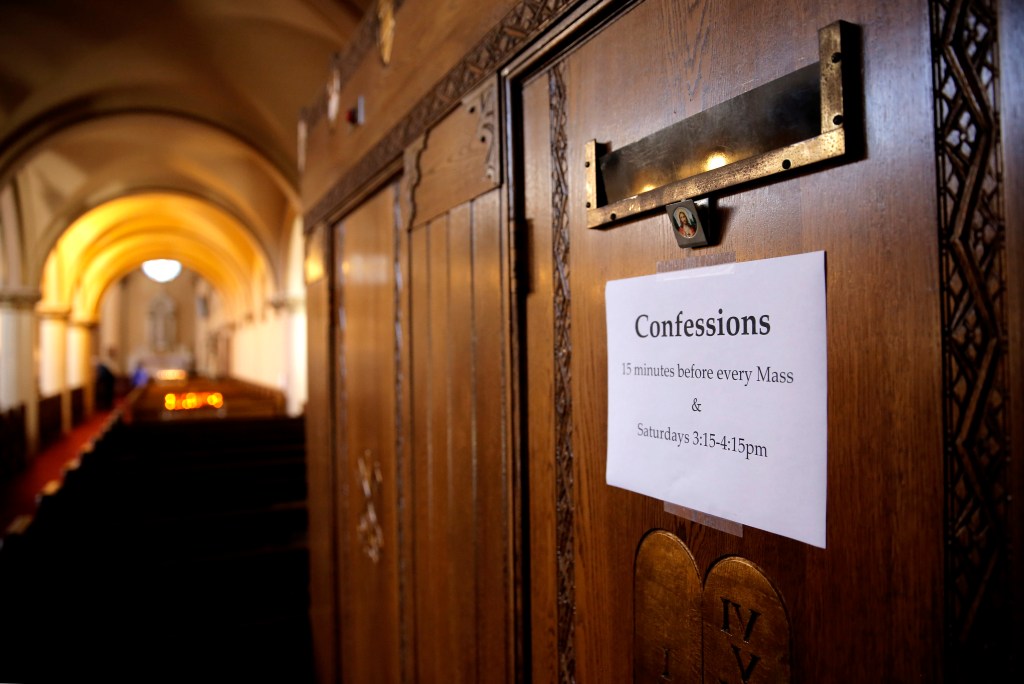The state of Washington, a pissant authority if ever there was one, is going to war with the Bill of Rights, the American liberal tradition, and, almost incidentally, the 20-century-old institution upon which Western civilization was founded. Becket, the public-interest law firm that sues to secure the free exercise of religion and is doing so in this case, could not be more perfectly named: The ghost of Henry II, who had Archbishop of Canterbury Thomas Becket murdered in order to facilitate the domination of the church by the state, is never far from us.
Washington has passed a law requiring that Catholic priests report certain sexual crimes that might be communicated to them in the confessional. Catholic clergy already operate under a similar reporting requirement (one imposed by the church, not by the state) that covers every other context, but the sacrament of reconciliation, as confession is more precisely known, is exempted from this, because it is a sacrament. Priests who fail to comply with this demand—which is to say, those who fail to violate their vows and break the sacramental seal—are threatened with imprisonment. Having been an occasional guest of some of the finest quarters offered by our carceral authorities, I can attest that this would represent for the clergy a relatively mild and bearable form of religious persecution, and I hope that, if it comes to it, they will do their time joyously—but I expect that Becket will win in this matter, because the state of Washington is so obviously wrong, and so stupidly, that even the Supreme Court could probably find a way to get it right.
I trust that my Protestant friends will forgive this Puritan-friendly Catholic what might sound at first like a sectarian point, but: While most Protestants today not only accept but also cherish the principle of religious liberty, the entire point of the English Reformation—not merely an unintended consequence—was ending the separation of church and state. English religious history does more than rhyme: They had two kings called Henry (II and VIII) with chancellors called Thomas (Becket and More) who became martyrs (in 1170 and 1535, respectively) because they insisted that there were limits to what a king could do to the church, that altar could not be entirely subordinated to throne. There is a reason so many of the churches of the Reformation became state churches: The Catholic Church was the premier European multinational organization, and it was not only in England that the Reformation was a nationalist project that produced national and nationalist churches. If you ever heard Nigel Farage talking about the European Union in the days before Brexit, you heard a very old and very English voice—and I do not mean only his accent.
Americans speak with a different accent (most Americans, anyway: My friend Charles Cooke is three times the American patriot I am, at least, in spite of his persistent Oxford pronunciation) but that English voice is still very much with us. American political culture is a product of Anglo-Protestant liberalism and still (in spite of the best efforts of many generations of vandals) bears the hallmarks of its creators. That is in most things an excellent outcome, but the Henrician line of thinking—that the church and its officers must ultimately bend the knee to the king rather than to the King of Kings—has never quite gone away. When you hear the evangelical atheists and grumpy little secularists of our time rage and snuffle about certain tax exemptions enjoyed by religious bodies, you are hearing an echo of William the Conqueror’s great-grandson, and he wasn’t the first to lodge that complaint. The remote reaches of history are never as remote as we think they are, particularly when it comes to the history of ideas, and extra-super-particularly when it comes to the history of bad ideas.
What Henry II and Henry VIII could not live with was the idea that there were centers of power independent of the state—that the power of the king was limited. Americans supposedly cherish the notion of limited government and insist that we would abide no king, but we are in most things perfectly happy to let presidents behave as though they were Louis XIV—as long as they are doing what we want them to do, or at least as long as they are irritating and discomfiting those we regard as our rivals and enemies. (Hatred is worse than a sin—it is a cause of unnecessary stupidity.) And, of course, those who would aggrandize the power of the state are rarely so clumsy as to do so in the service of something that is obviously wicked but instead do so in the pursuit of something desirable: in this case, punishing people who commit some of the worst crimes there are.
Again, there is nothing new in this: Henry II was very much concerned about the cases of “criminous clerks,” meaning clergymen accused of serious crimes of a nonreligious nature, and there was a particular focus on cases of sexual wrongdoing. (In the excellent cinematic version of these events, Becket, the matter immediately at hand is a priest “accused of debauching a young girl.” I assume that this film is no more faithful to historical events of the 12th century than Oliver Stone’s Nixon is to the events of the 1970s or Richard Attenborough’s Gandhi is to events of the first half of the 20th century. But that isn’t exactly the point of this kind of film.) Nobody wants to see child molesters go unpunished. And no red-blooded Englishman of the 12th century doubted that mustering forces to kick the stuffing out of the French was a positive moral good and a patriotic necessity, and English patriots of the 16th century were not wrong to complain of Roman corruption or to resent self-interested papal intervention in English political affairs. “Shall I be tempted of the devil thus?” Queen Elizabeth asks in Shakespeare’s Richard III. “Ay,” the villain answers, “if the devil tempt you to do good.” That play probably was written about 1592—again we have a very old story, and it keeps ending the same way: You cannot defend liberty with the sword of tyranny.
And Washington’s intrusion into the confessional is tyranny. Even if it doesn’t feel like tyranny.
If you cleave to a political philosophy holding that there is nothing outside of the state, then you are a partisan, however well-meaning, of absolutism and totalitarianism. Not every totalitarian temptation indulged leads directly to 1984. (The philosophy of the American left “is a totalitarian political religion, but not necessarily an Orwellian one,” Jonah Goldberg once put it. “It is nice, not brutal. Nannying, not bullying, but it is definitely totalitarian, or holistic, if you prefer, in that liberalism today sees no realm of human life that is beyond political significance, from what you eat to what you smoke to what you say.”) There are many stops, many way stations, and (one prays) many off-ramps along the road to serfdom. But allowing the state to shove its stupid snout into the confessional is a big step in the wrong direction. It is one that should be resisted not only by litigation but also through civil disobedience, if necessary.
You may have heard these famous lines from Cardinal Francis George, the late archbishop of Chicago, envisioning life under such totalitarian assumptions:
I expect to die in bed. My successor will die in prison. And his successor will die a martyr in the public square. His successor will pick up the shards of a ruined society and slowly help rebuild civilization, as the church has done so often in human history.
The cardinal’s words had more impact than he intended: “I was responding to a question and I never wrote down what I said,” he later said about his famous statement, “but the words were captured on somebody’s smartphone and have now gone viral.” But his views were no less dramatic when expressed in less dramatic language: “The greatest threat to world peace and international justice is the nation state gone bad, claiming an absolute power, deciding questions and making ‘laws’ beyond its competence,” he later wrote. And his actions bore out his convictions: When the state of Illinois insisted that funding for adoption and foster care providers would be restricted to those that agreed to provide services to same-sex couples, the cardinal, with regret, instructed Catholic Charities to refuse to comply, and the archdiocese eventually discontinued those services. That is the totalitarian tendency at work: The question wasn’t whether there would be 500 adoption agencies that serve same-sex couples but whether the 12.7 million people of Illinois could tolerate one that did not.
There are many legal questions at play here, which I trust will be handled by The Dispatch’s growing constellation of legal stars with customary excellence. But this is not, finally, a legal question—it is, rather, a question of that which is prior to the law, that which is above it and beyond it and which, by its nature, sets limits on how far lawmakers may venture into the territory of the sacred. The church is a kind of embassy, sovereign within the four walls of its sanctuary irrespective of whether any statute recognizes the fact. Sovereignty that is violated does not cease to be sovereignty—it becomes sovereignty that needs defending, whether it is from one big bully in Moscow or from 147 little ones in Olympia.
Economics for English Majors
Young people ask me for career advice more often than you’d think. (I mean: more often than you’d think if you are a sensible person.) Some time ago, I had a conversation with a young person who was convinced that his boss, who had hired him, wanted him to fail and was sabotaging him to ensure that he did.
I very much doubted that this was the case, and said so. Yes, the world is full of fallen people and deformed institutions, but, in general, a manager who hires an employee wants to see that employee succeed. For one thing, recruiting new employees is a disruptive and at times expensive process, one that usually comes with significant transaction costs; unnecessary turnover in an organization is a sign of deficient management. An employee’s performance colors (sometimes unfairly!) institutional perception of the hiring manager’s decision-making—a new employee’s failure is of concern most immediately and urgently to that employee (failure is his problem, even when it is not entirely his fault) but it also is a concern for the one who hired him. I can think off the top of my head of three or four cases in which a bad hire had serious consequences for the manager who did the hiring, with uncomfortable meetings on the subject of: What the hell were you thinking?
But there are contexts where this isn’t the case. I was thinking of the weird situation of labor markets in professional sports leagues, where certain unusual arrangements such as payroll caps mean that employee turnover can create very desirable business opportunities in a way that you wouldn’t normally expect to see in a more conventional labor market. Here is an extract from an older but still interesting paper published by the National Bureau of Economic Research:
Unlike most other unions, players’ associations in North America and Europe do not negotiate salaries for their individual members. That is handled by the player himself, generally through an agent. The associations do bargain collectively over working conditions, pension benefits and insurance, grievance procedures and, in North America but not in Europe, league-wide arrangements such as a minimum salary, any direct restrictions on total payrolls or individual salary caps, or owners’ incentives to compensate players (“luxury taxes” in baseball). Players’ associations have generally opposed plans by owners to cap payrolls, and owners have, especially after the dissolution of reserve systems, proposed various schemes to restrict open bidding for players: the NBA instituted a payroll cap for the 1983–84 season (and beyond); football (the NFL) followed suit in 1993; Major League Baseball’s unsuccessful attempt to force a cap in 1994 ultimately led to the players’ strike of 1994–95, and it ended with the owners nevertheless getting a second-best outcome, a (“luxury”) tax on payrolls that exceeded specified levels. Associations have also generally opposed widespread revenue sharing among owners. Reducing the incentive to win decreases the value of players and thus would, as demand for their services declines, lead to lower average salaries.
That final point is very, very interesting. I suppose I should not be surprised that it is in professional sports that the labor unions have best understood the value of competition.
A bit more:
The economic issues revolve around the fact that consumer demand depends on inter-team competition and rivalry. A self-interested team would never acquire so much talent as to make its games predictable and dull: this is just an example of the fact that the marginal value of one team’s quality depends on the quality of other teams. In a sense there is nothing unusual here. After all, the marginal product of labor in a neoclassical production function depends on the amount of capital, and conversely. Market prices and competition for labor and capital ensure that social and private margins are equated and that decentralized decisions are efficient. In sports it is useful to think of the contest as output and teams as inputs that produce the output. Efficient decentralization dictates that the teams themselves compensate each other for the joint value they collectively add to the game. Externalities arise when the prices faced by teams for services rendered are set improperly; creating inefficient incentives for individual teams to gain a competitive edge in the talent market. Efficient transfer prices among teams would eliminate the inefficiency.
Words About Words
Above, I wrote about Cardinal Francis George. But if I were indulging my paleolinguistic tendency, I would have written: Francis Cardinal George or even Francis, Cardinal George. A cardinal is a princely figure and, traditionally, cardinal was treated as a princely title. Royal and noble titles standing by themselves may be capitalized where we would not capitalize republican or clerical titles such as president or pope because those royal titles function as names and, hence, as proper nouns: For example, in the abovementioned Richard III, we meet a character called “Buckingham,” but his name was “Henry Stafford, 2nd Duke of Buckingham.” For official purposes, his name was “the Duke of Buckingham” or, simply, “Buckingham,” in the same way that one might write “the Prince of Wales” as substitute for the man known in his school days as “William Wales,” one of those awkward constructions necessitated by trying to shove people with royal names into the more familiar first-name/last-name convention. Prince William has used different surnames, in fact: first Wales, then Cambridge, and then Wales again. Similarly, the Rev. Justin Welby might (before he resigned) have been referred to, properly and conveniently and simply, as the “Archbishop of Canterbury.” But you would write: The senior figure in the English church has been the archbishop of Canterbury for more than 1,000 years.
John, Cardinal Smith became John Cardinal Smith the same way Alfred, Lord Tennyson, became Alfred Lord Tennyson—commas are short-lived things in the wild.
When Jewish leaders met at the Vatican with church leaders to prepare a joint communique to be issued at the close of a meeting with Pope John Paul II, Rabbi Marc H. Tanenbaum of the American Jewish Committee noted a surprisingly informal construction in the Catholic draft. The document referred to the president of the Commission for Religious Relations With the Jews as “Cardinal John Willebrands.”
“Shouldn’t this read ‘His Eminence, John Cardinal Willebrands’?” asked the rabbi, referring to the ancient, formal style stemming from the time the nobility put the Christian name before the title, as in “William, Duke of Norfolk.”
“We don’t do that anymore,” said Cardinal Willebrands cheerfully, and into the historic communique went a couple of references to cardinals using the title before the first name.
The statement read: “On Tuesday morning, the Jewish delegation met with Cardinal Agostino Casaroli.” That was how the text appeared in The New York Times, but the accompanying news story clung grimly to the old ways: “This morning the Jews met with Agostino Cardinal Casaroli.”
In some matters, The Times thinks in terms of centuries.
In Other Wordiness …
“All individuals must control their baggage at all times,” says the airport announcement. The individuals have been put on notice—but what about the utter conformists? What of their baggage? I mean their literal baggage, not the emotional stuff.
Also: Doesn’t it seem like there are more airport announcements saying, “Hey, dummy, leave your gun in the car” than there were a few years ago? Maybe it’s just my airport.
Also: The Washington Post offered a wonderful howler (quietly amended) about the new pope:
“Hallelujah,” he intoned reverently, in Latin.
They say that there’s a secret chord that David played, and it pleased the Lord, but you don’t really care for copy editors, do ya? Somebody hasn’t been reading their psalms and such, where “hallelujah” is intoned reverently in Hebrew.
And every Indiana Jones fan knows there’s no “J” in Latin! Gah.
Also also: The New York Times, in a story about divorce coaches, wrote:
Alexa Wolkoff, a licensed clinical social worker and a divorce coach based in Croton-on-Hudson, N.Y., has been coaching for five years. Her interest in the industry peaked in 2017, when custody issues with her ex-husband led her to seek support with her divorce agreement. She joined One Mom’s Battle, an organization that supports women navigating separation. When the opportunity arose to train under one of the organization’s leaders, Ms. Wolkoff decided to pursue certification as a divorce coach.
Given that she went to work in the field, I do not think that Alexa Wolkoff’s interest in it peaked in 2017—more likely, her interest was piqued, or aroused, by that custody dispute. Pique is from the French piquer, meaning to prick, related to the words pike and probably, if you go back far enough, poke. (Ne piquez pas l’ours!) The fabric known as pique gets that name from the term for backstitched, from the same pokey-pricky root.
Not germane, but I cannot help but observe that the Times story focuses on a divorce coach who works in Miami and Los Angeles and is accompanied by a photo that looks like someone told an AI prompt: “Give me an image of a guy who looks exactly like a Miami-based divorce coach.”
Elsewhere
You can buy my most recent book, Big White Ghetto, here.
You can buy my other books here.
You can check out “How the World Works,” a series of interviews on work I’m doing for the Competitive Enterprise Institute, here.
In Closing
So, DOGE and Elon Musk—everybody out there in Trumpworld is feeling real smart, huh?










Please note that we at The Dispatch hold ourselves, our work, and our commenters to a higher standard than other places on the internet. We welcome comments that foster genuine debate or discussion—including comments critical of us or our work—but responses that include ad hominem attacks on fellow Dispatch members or are intended to stoke fear and anger may be moderated.
With your membership, you only have the ability to comment on The Morning Dispatch articles. Consider upgrading to join the conversation everywhere.